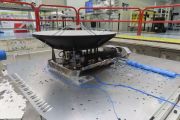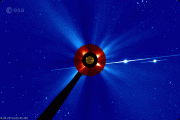
Copernical Team
New radiation-tolerant microcontrollers introduced for satellite constellations
 Vorago Technologies announced the release of four new radiation-tolerant microcontrollers designed for low Earth orbit applications, with first shipments expected in early Q1 2026. These chips address the reliability needs of satellite constellations while reducing costs by up to 75% compared to traditional space-grade electronics.
The VA4 family of microcontrollers uses ARM Cortex M4-base
Vorago Technologies announced the release of four new radiation-tolerant microcontrollers designed for low Earth orbit applications, with first shipments expected in early Q1 2026. These chips address the reliability needs of satellite constellations while reducing costs by up to 75% compared to traditional space-grade electronics.
The VA4 family of microcontrollers uses ARM Cortex M4-base York Space Systems prepares for public offering as satellite deployments and contract wins drive growth
 York Space Systems has taken a significant step toward becoming a publicly traded company, formally filing a registration statement with the U.S. Securities and Exchange Commission. This move follows years of expansion driven by successful satellite launches, delivery of key government projects, and marked financial gains.
Headquartered in Denver, York Space Systems has established itself
York Space Systems has taken a significant step toward becoming a publicly traded company, formally filing a registration statement with the U.S. Securities and Exchange Commission. This move follows years of expansion driven by successful satellite launches, delivery of key government projects, and marked financial gains.
Headquartered in Denver, York Space Systems has established itself Fast Satellite Ground Synchronization Technology Advances Beam Hopping Communications
 Researchers from Xidian University, CAST-Xi'an Institute of Space Radio Technology, Beijing Institute of Technology, and the Global Big Data Technologies Centre at University of Technology Sydney have analyzed the requirements for synchronizing satellite beam hopping with ground signal stations to enhance high-throughput satellite (HTS) communication capacity.
HTS systems use multibeam tec
Researchers from Xidian University, CAST-Xi'an Institute of Space Radio Technology, Beijing Institute of Technology, and the Global Big Data Technologies Centre at University of Technology Sydney have analyzed the requirements for synchronizing satellite beam hopping with ground signal stations to enhance high-throughput satellite (HTS) communication capacity.
HTS systems use multibeam tec Quantum timing and sensing partnership set to reshape space infrastructure
 Voyager Technologies and Infleqtion have formed a strategic partnership to deploy dual-use quantum technology in low-Earth orbit and beyond. The initiative aims to transfer quantum utility from laboratory environments to operational space applications, beginning with the integration of Infleqtion's Tiqker Quantum atomic clock aboard the International Space Station and later on the Starlab platfo
Voyager Technologies and Infleqtion have formed a strategic partnership to deploy dual-use quantum technology in low-Earth orbit and beyond. The initiative aims to transfer quantum utility from laboratory environments to operational space applications, beginning with the integration of Infleqtion's Tiqker Quantum atomic clock aboard the International Space Station and later on the Starlab platfo LHAASO identifies black holes as source of cosmic ray knee phenomenon
 The Large High Altitude Air Shower Observatory (LHAASO) has released results that clarify the origin of the knee in the cosmic ray energy spectrum. This feature, recognized by its sharp decline in cosmic ray numbers above 3 PeV, has puzzled researchers for nearly 70 years.
Recent studies published in National Science Review and Science Bulletin reveal that micro-quasars powered by black ho
The Large High Altitude Air Shower Observatory (LHAASO) has released results that clarify the origin of the knee in the cosmic ray energy spectrum. This feature, recognized by its sharp decline in cosmic ray numbers above 3 PeV, has puzzled researchers for nearly 70 years.
Recent studies published in National Science Review and Science Bulletin reveal that micro-quasars powered by black ho Simulated Milky Way with AI and supercomputing sets star modeling milestone
 Researchers at the RIKEN Center for Interdisciplinary Theoretical and Mathematical Sciences in Japan, collaborating with The University of Tokyo and Universitat de Barcelona, have delivered the first simulation of the Milky Way that models over 100 billion individual stars spanning ten thousand years. The project utilized artificial intelligence alongside numerical simulations to achieve this sc
Researchers at the RIKEN Center for Interdisciplinary Theoretical and Mathematical Sciences in Japan, collaborating with The University of Tokyo and Universitat de Barcelona, have delivered the first simulation of the Milky Way that models over 100 billion individual stars spanning ten thousand years. The project utilized artificial intelligence alongside numerical simulations to achieve this sc Water ice detection campaign prepares lunar robots for Moon mission
 Researchers in Germany have conducted a campaign at the LUNA Analog Facility in Cologne to evaluate how water ice could be located and mapped on the Moon. Instruments and robotic vehicles were used in a simulated lunar environment with a substantial area covered in regolith material similar to Moon dust.
The Polar Explorer campaign at LUNA tested the mobility and sensing abilities of two r
Researchers in Germany have conducted a campaign at the LUNA Analog Facility in Cologne to evaluate how water ice could be located and mapped on the Moon. Instruments and robotic vehicles were used in a simulated lunar environment with a substantial area covered in regolith material similar to Moon dust.
The Polar Explorer campaign at LUNA tested the mobility and sensing abilities of two r Star Catcher achieves milestone for wireless energy delivery to Moon missions
 The lunar South Pole has gained attention from scientific and commercial sectors due to long-term exploration plans and its possible water ice deposits, which may enable future life support and fuel production. Deep craters in permanent shadow make this region a focal point for NASA's Artemis program and other international initiatives.
Recent technology demonstrations aim to overcome hars
The lunar South Pole has gained attention from scientific and commercial sectors due to long-term exploration plans and its possible water ice deposits, which may enable future life support and fuel production. Deep craters in permanent shadow make this region a focal point for NASA's Artemis program and other international initiatives.
Recent technology demonstrations aim to overcome hars Blue Origin's New Glenn Nails First Ocean Booster Landing
 Blue Origin's New Glenn rocket successfully made its way to orbit for the second time on Nov. 13, 2025. Although the second launch is never as flashy as the first, this mission is still significant in several ways.
For one, it launched a pair of NASA spacecraft named ESCAPADE, which are headed to Mars orbit to study that planet's magnetic environment and atmosphere. The twin spacecraft wil
Blue Origin's New Glenn rocket successfully made its way to orbit for the second time on Nov. 13, 2025. Although the second launch is never as flashy as the first, this mission is still significant in several ways.
For one, it launched a pair of NASA spacecraft named ESCAPADE, which are headed to Mars orbit to study that planet's magnetic environment and atmosphere. The twin spacecraft wil PLD Space expands rocket subsystem testing leadership in Europe
 PLD Space is now operating its Teruel Airport testing facility at maximum capacity, with over 155,000 square meters dedicated to rocket development. The company utilizes ten self-designed test benches for its MIURA 5 launcher, establishing the largest private rocket testing infrastructure in Europe and strengthening its vertical integration strategy.
Subsystem qualification for MIURA 5 pro
PLD Space is now operating its Teruel Airport testing facility at maximum capacity, with over 155,000 square meters dedicated to rocket development. The company utilizes ten self-designed test benches for its MIURA 5 launcher, establishing the largest private rocket testing infrastructure in Europe and strengthening its vertical integration strategy.
Subsystem qualification for MIURA 5 pro 



































